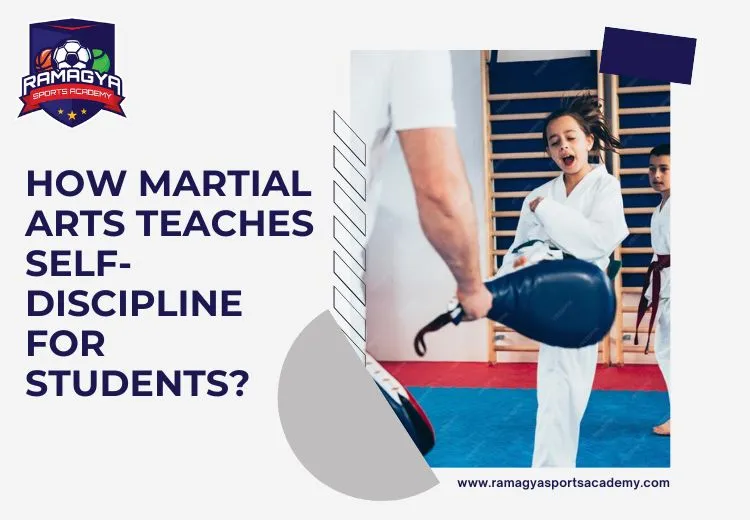
Factors to Consider When Choosing Dance Classes for Kids
April 9, 2024
Gautam Buddha Nagar Open Roller Sports Skating Championship 2024
April 18, 2024How Martial Arts Teaches Self-Discipline for Students?
 Martial arts represent a history of traditions rooted in discipline, respect, and self-mastery, thus making an invaluable contribution to teaching self-discipline for students. For teaching self discipline to students, martial arts can be a key to open that door. At a time when there are so many distractions and instant gratification options, instilling self-discipline in children has never been more essential. Martial arts offer a holistic way of developing this essential life skill, transcending mere physical techniques into an entire philosophy of self-growth and moral development.
Self-discipline for students is very necessary for their overall growth. Martial arts practiced both within the dojo and out in daily life foster values beyond combat, teaching their practitioners respect for oneself and others, perseverance, and self-control. Children engage in an incredible transformational journey towards self-discipline through rituals, structured training, and supportive community engagement through martial arts. They learn how to better control impulses, emotions, and actions towards long-term goals.
This comprehensive guide explores all the various ways martial arts empower children with the self-discipline necessary for meeting life’s challenges with confidence, integrity, and grace:
Martial arts represent a history of traditions rooted in discipline, respect, and self-mastery, thus making an invaluable contribution to teaching self-discipline for students. For teaching self discipline to students, martial arts can be a key to open that door. At a time when there are so many distractions and instant gratification options, instilling self-discipline in children has never been more essential. Martial arts offer a holistic way of developing this essential life skill, transcending mere physical techniques into an entire philosophy of self-growth and moral development.
Self-discipline for students is very necessary for their overall growth. Martial arts practiced both within the dojo and out in daily life foster values beyond combat, teaching their practitioners respect for oneself and others, perseverance, and self-control. Children engage in an incredible transformational journey towards self-discipline through rituals, structured training, and supportive community engagement through martial arts. They learn how to better control impulses, emotions, and actions towards long-term goals.
This comprehensive guide explores all the various ways martial arts empower children with the self-discipline necessary for meeting life’s challenges with confidence, integrity, and grace:
Building Self-Discipline in Students
- Understanding Self-Discipline: Self-Discipline for students is one of the cornerstones of success in life, and martial arts offer an effective platform for its development in children. Martial arts discipline extends beyond physical techniques – it involves adhering to rituals, respect for instructors and peers alike, as well as persevering when facing challenging circumstances. Children learn to set goals and reach them using structured belt ranking systems, instilling dedication and commitment. Through rigorous training, children develop focus, concentration and resilience – helping them overcome any obstacles with determination. Martial arts also foster self-control and emotional regulation in children, teaching them how to manage stress effectively and frustration constructively. By instilling discipline holistically, martial arts equip kids with the inner strength and resilience needed to navigate life’s complexities with pride and integrity.
- Martial Arts Have Their Foundations in Mind: Martial arts go far beyond simply physical combat techniques; their rich traditions instill discipline and values into practitioners – especially children. Self discipline for students and its foundation in mind is very necessary for their whole development. Traditions form the core of martial arts training, emphasizing respect, humility, and self-improvement. Children enter dojos immediately immersed in rituals and etiquette that teach discipline and obedience in them. Bowing before entering, addressing instructors with their correct titles, and adhering to a structured code of conduct are all effective means of inculcating discipline. Martial arts philosophy emphasizes excellence through continuous self-improvement, encouraging children to embrace discipline as an underlying principle in both training and daily life. Internalizing these guiding principles teaches children that success in martial arts – as in life – requires unwavering commitment, respect for others, and strong self-discipline.
- Rituals and Etiquette: Etiquette and rituals play a crucial role in the way that martial arts help instill discipline in youngsters. As soon as they enter the dojo, they are surrounded by a disciplined space that is guided by a tradition of respect and reverence. Bowing when entering and leaving the area of training, speaking to instructors with proper titles and adhering to a code of conduct fosters discipline and the habit of obedience. These routines teach youngsters the importance of observing the rules of authority and following them instilling a sense of discipline from the very beginning. Through consistent practice of these rules children learn the importance of self-control and discipline, that extend beyond the boundaries within the dojo. In addition, being respectful to the other players and peers fosters respect and sportsmanship[1] while strengthening the fundamentals of respect and discipline. Through etiquette and rituals, martial arts can provide kids with an opportunity to develop self-control as well as laying the basis to their growth and progress as individuals and martial artists.
- Focus and Concentration: Martial arts instruction teaches children essential concentration and focus skills which help develop self-discipline for students. Through the practice of different techniques, forms, and drills, they can be taught to direct their attention away from any potential distractions and redirect it toward worthwhile activities. Martial arts instructors stress the importance of being in the training session and teach kids to remain completely immersed in the moment. A disciplined and focused practice of martial arts does not just improve its performance but can also be applied to other aspects of their lives like classes or other daily chores. As they work to improve their skills and learn new techniques, they develop confidence and perseverance while enhancing their ability to concentrate on their focus on the goals they have set. Martial arts teach children the ability to concentrate, which helps students tackle problems head-on and overcome obstacles to achieve success both within the dojo as well as in the community.
- Self control and Emotional Regulation: Controlling your emotions and self-control are the foundations of self-control that martial arts can instill in youngsters. Through a rigorous program of training and guided training, children are taught to control their emotions, impulses, and their reactions efficiently. Martial arts emphasize the importance of discipline when it comes to controlling the mind and body, and helping children learn to stay calm even in stressful situations. Through controlled breathing and movements children gain greater self-awareness as well as emotional intelligence. They learn to identify their emotions effectively rather than responding with impulse. Children in a dojo environment are taught resilience and determination in order to overcome frustrations or setbacks that arise during training sessions. Martial arts skills not only increase performance, but they can also empower children to navigate life with grace and ease. By developing self-control and emotional regulation skills, children develop self-discipline to achieve their goals and thrive throughout their lives.
- Leadership and Responsibility: Leadership and responsibility are integral aspects of self-discipline for students that martial arts teaches. As they advance in their training, more leadership roles and responsibilities within the dojo are assigned to them. No matter if they’re helping lower-ranked students, leading warm-up exercises, or demonstrating techniques, students learn to take ownership of their actions and inspire others through their example. Martial arts foster a sense of responsibility towards one’s community and peers, developing leadership skills and character traits in children. Children learn by example to lead with integrity, humility, and respect in all interactions with others. By serving as role models, they encourage their peers to strive for excellence while positively contributing to the dojo environment. Through martial arts practice, children gain insight into leadership as something other than exerting power over others; rather, it promotes compassion and humility when serving others, thus instilling responsibility and self-discipline into their daily lives.
Conclusion:
Martial arts provide an effective platform for children to develop self-discipline in a holistic and transformative manner. Children engaged in martial arts find strength in cultivating inner strength and resilience that will serve them well as they face life’s challenges in today’s globalized environment. By immersing them in a structured, respectful, perseverant environment based on respect, perseverance, and personal responsibility, martial arts help children build the inner strength necessary for survival in today’s society. Every aspect of martial arts training helps young practitioners develop self-discipline – from rituals and etiquette, goal setting, focus training, and emotional regulation to developing emotional regulation skills. As children progress through their martial arts journey, they not only develop physical skills but also internalize life lessons that shape both character and mindset. Martial arts offer children a path toward self-mastery – equipping them with tools necessary for personal growth, success, and fulfillment in all areas of their lives.Read our Article: What are Importance of Sports in Student’s Life



